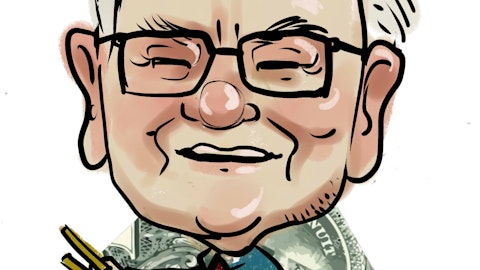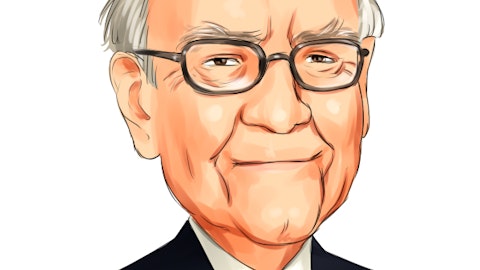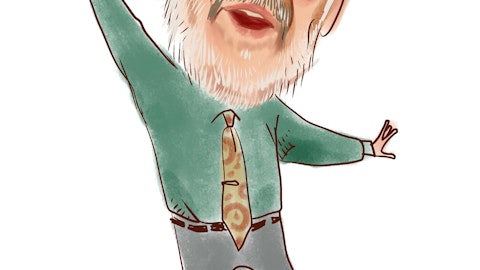Comcast Corporation (NASDAQ:CMCSA)
| $US Millions | 2008 | 2009 | 2010 | 2011 | 2012 |
| Net debt | 31,202 | 28,375 | 25,350 | 37,689 | 28,000 |
| Financial costs | -2,439 | -2,348 | -2,156 | -2,505 | -2,520 |
| EBIT | 6,732 | 7,214 | 7,980 | 10,721 | 12,200 |
| Net Debt vs. EBIT | 4.6 | 3.9 | 3.2 | 3.5 | 2.3 |
| Cash flow from operations | 10,231 | 10,281 | 11,179 | 14,345 | 14,850 |
| Cash flow from investing | -7,477 | -5,897 | -5,711 | -12,508 | -1,500 |
| Free cash flow | 2,754 | 4,384 | 5,468 | 1,837 | 7,530 |
| Cash flow from financing | -2,522 | -4,908 | -155 | -6,201 | -4,040 |
| Net change in cash | 232 | -524 | 5313 | -4364 | 9,330 |
Comcast is larger than DirecTV and its biggest competitor. Comcast has a much better balance sheet and cash flow than DirecTV. Starting with debt, Comcast has seen both increases and decreases in its net debt position, recently however, the company has been reducing its net debt to EBIT level as profits rise while net debt falls.
Comcast’s EBIT has almost doubled since 2008; net debt in relation has remained relatively stable. Net debt to EBIT has fallen from 4.6 times to 2.3 last year.
In addition, Comcast’s cash flow is stronger than DirecTV’s. While Comcast’s net operating cash flow is almost triple that of DirecTV, the company is not spending all of its free cash on share buybacks. Comcast’s net financing cash flow for 2012 was -$4,040 million, of which $2,800 million was share buybacks and $1,600 million was dividends. Comcast also re-organized a portion of its debt to take advantage of lower interest rates.
Not only does Comcast has a much better debt profile than DirecTV but the company is also utilising its cash and cash flow in a more effective way, which is producing better shareholder returns.
Viacom, Inc. (NASDAQ:VIAB)
| $US Millions | 2008 | 2009 | 2010 | 2011 | 2012 |
| Net debt | 7,210 | 6,475 | 5,915 | 6,344 | 7,301 |
| Financial costs | -514 | -440 | -435 | -419 | -425 |
| EBIT | 2,977 | 2,937 | 2,943 | 3,854 | 3,901 |
| Net Debt vs. EBIT | 2.4 | 2.2 | 2.0 | 1.6 | 1.9 |
| Cash flow from operations | 2,036 | 1,151 | 1,147 | 2,644 | 2,498 |
| Cash flow from investing | -571 | -274 | -168 | -227 | -256 |
| Free cash flow | 1,465 | 877 | 979 | 2,417 | 2,242 |
| Cash flow from financing | -1,555 | -1,388 | -436 | -2,227 | -2,413 |
| Net change in cash | -90 | -511 | 543 | 190 | -171 |
Viacom’s balance sheet is once again, in a much better position than DirecTV. Viacom’s net debt position has not fallen or risen over the past five years. In addition, over this period the companies EBIT has grown, which has resulted in a falling EBIT value – in fact it is the smallest ratio in the group.
Looking at Viacom’s cash flow, the company is following the same path as Comcast. Viacom has a strong free cash flow and the company is utilizing this to buy back stock, issue dividends and buy back debt. These activities are well managed and the company is only spending what it earns, which gives the company a relatively balanced cash inflow/outflow ratio.
Comcast and Viacom look to be better at cash management and debt reduction, what about growth and return on equity?
Growth and ROE
| ROE average last 5 years | EPS growth past 5 years | Sales growth last 5 years | Profit Margin | |
| Comcast | 8.40% | 16.30% | 17.50% | 13.40% |
| Viacom | 20.60% | 16.40% | 16.40% | 17.10% |
| DirecTV | 59.00% | 25.40% | 13.10% | 9.40% |
I believe ROE is one of the best ways to measure a company’s returns for shareholders. DirecTV has achieved the best ROE over the last five years, although I would be skeptical of this figure as DTV’s shareholder equity has actually been negative since 2010- as I have mentioned above.
DirecTV has achieved the best EPS growth due to its large stock buybacks. Comcast and Viacom have both achieved a larger sales growth than DirecTV. Furthermore, both Comcast and Viacom have achieved much better profit margins, with Viacom’s profit margin being almost twice that of DirecTV’s.
Overall
So overall, DirecTV is borrowing lots of money to buy back stock, while its share price is reaching five year highs and shareholder equity is negative. Not only is this wasting hard earned shareholder cash but the company is significant increasing its debt to EBIT ratio, which could put huge pressure on the company’s cash flow in future years if sales start to stagnate or interest rates rise.
On the other hand, both Comcast and Viacom are utilizing their shareholders cash in more constructive ways, returning cash to shareholders through both dividends and buybacks, without borrowing huge amounts of cash.
All in all, DirecTV may be Buffett’s favourite but it is not mine.
Data Source: Saxo Capital Markets, Marketwatch
The article Buffett Likes DirecTV, But Should You? originally appeared on Fool.com and is written by Rupert Hargreaves.
Copyright © 1995 – 2013 The Motley Fool, LLC. All rights reserved. The Motley Fool has a disclosure policy.





